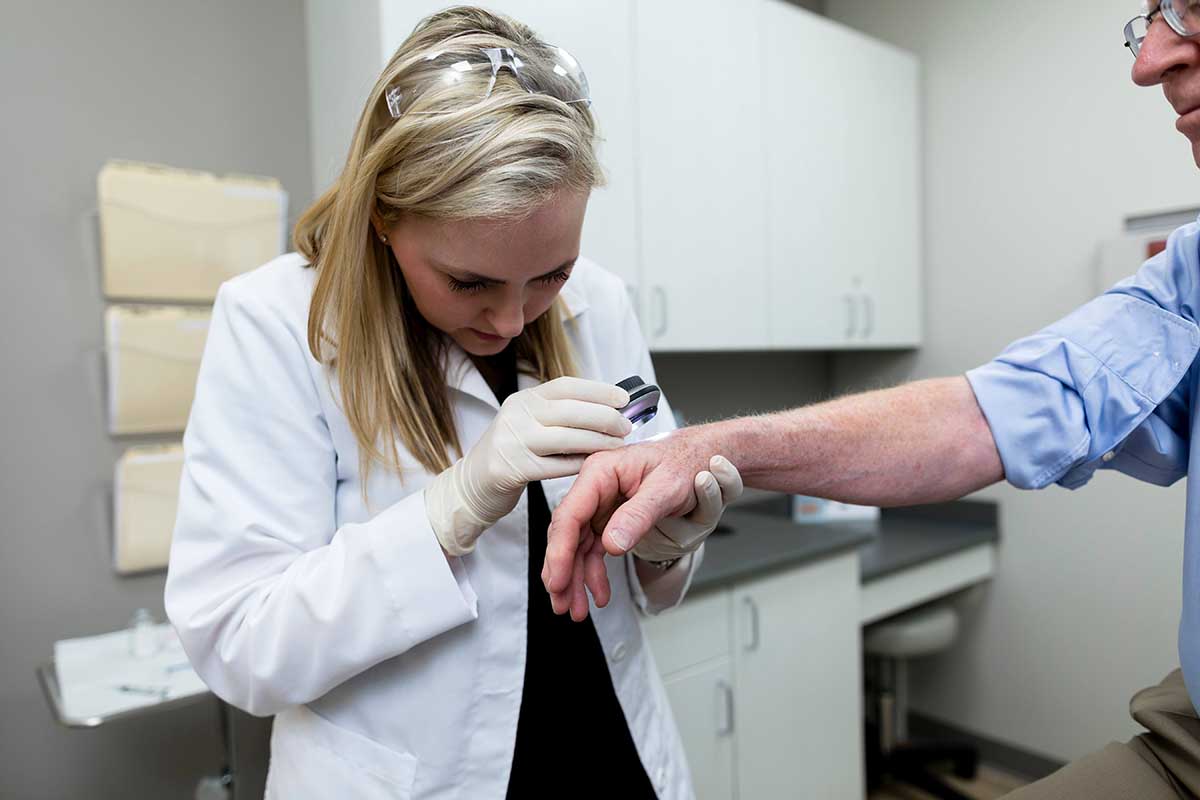FULL-BODY SKIN EXAMS & SKIN CANCER SCREENINGS IN FREMONT
At our Fremont dermatology clinic, skin exams and skin cancer screenings and treatments are some of the most common services our patients seek. Data from the American Academy of Dermatology reveals that about 20% of Americans will develop skin cancer during their lifetime. It's important to note that no one is immune to skin cancer, regardless of their skin color. Regular skin exams become increasingly vital with age, as they can help detect skin cancer at an early stage. If there's a history of skin cancer in your family or you are concerned about melanoma, our dermatologists in Fremont are available to provide personalized screenings and treatments.
Dr. Tina Kinsley and Dr. Rensch, as well as physician assistants Amanda Hotovy and Jennifer Keenan, perform full-body skin exams at MOD Dermatology Fremont. These are vital for individuals with multiple or unusual moles, cancerous spots, pre-cancers, melanoma, and basal cell or squamous cell skin cancer. Other health concerns that could increase the risk of skin cancer also necessitate these examinations. Our primary goal is to swiftly identify and manage any signs of skin cancer.

WHO SHOULD SCHEDULE A FULL-BODY SKIN EXAMINATION?
Every type of skin can develop skin cancer, but some factors might put you at a higher risk. If you belong to any of these groups, it would be prudent to schedule a skin exam at our office in Fremont:
- People needing a baseline skin examination and guidance on skin cancer signs
- Those with past precancerous spots such as actinic keratosis, squamous cell carcinoma, or basal cell carcinoma
- Anyone with a history of melanoma
- Those with family members who've had melanoma
- People having atypical nevi or unusual moles
- Those who've used tanning beds or indulged in outdoor tanning
- Anyone who has experienced multiple sunburns
- People who get a lot of sun exposure or who work outside often
What to Expect During a Skin Exam
The idea of having your entire skin checked can seem daunting for some, particularly if they're uncertain about what will happen. Our aim is to make this process as relaxing as possible by supplying a gown and ensuring modesty throughout the skin exam at our Fremont office. Skin cancer can appear anywhere on your body, from the top of your head to the bottom of your feet, so it's crucial to have a complete skin checkup. Although Dr. Kinsley, Dr. Rensch, and Physician Assistant Amanda Hotovy prefer to examine all of your skin, you may undress to your comfort level.
During a skin exam, a dermatoscope, similar to a flashlight-microscope combo, is used to inspect moles and lesions closely. If any unusual spots or moles are detected, the next step is to decide whether to keep an eye on them or biopsy (remove) them. Biopsies are skin samples that are sent for tests to check for malignancy. The procedures for melanoma and skin growth biopsy at MOD Dermatology in Fremont are designed with the utmost comfort for patients in mind.
How to do a self-skin exam
Even if a professional skin exam is generally required just once annually, it's important to regularly conduct self-skin exams every month. This routine check will help you monitor any changes in moles and aid in detecting any worrying areas promptly.
Here’s how to perform a skin exam on yourself:
Find a bright room and stand in front of a mirror. Use a hand-held mirror to look at places like the back of your legs, neck, and torso. A good friend, spouse, or family member can help you inspect areas you can't see well, like your scalp.
Pay attention to the shape, size, and color of your moles, freckles, and other spots. Remembering how they look or taking pictures can help you spot any changes next time you check.
Start your exam with your face, ears, neck, chest, and stomach. Then look at your armpits, the front and back of your arms, the tops and palms of your hands, between your fingers, and under your nails. Don’t forget to check the skin underneath breasts and skin folds.
While sitting down, check over your legs including the tops of thighs, shins, feet, between toes, and under toenails. Then use your hand mirror to see the bottom of your feet, calves, and backside of your thighs.
Stand up again and use a small mirror to examine your buttocks, genital areas, and lower back. Also look at the backside of your neck, ears, and upper back. These areas are easier to see if you use a smaller mirror against a bigger wall mirror.
Finally, divide your hair into sections using a comb for closer inspection of the scalp.
WHAT SHOULD I LOOK FOR DURING A SELF-SKIN EXAM?
When doing your self-skin exam, these are some things you should look for and remember:
1. It's essential to keep an eye on any spots, moles, or lumps that have appeared recently or have changed in size, shape, or color since your last skin examination.
2. Another point of concern is a sore or wound that continues to bleed and doesn't heal after a few weeks.
3. Any patches on the skin that are rough, scaly, or irritated and become crusty or bleed should also be monitored closely.
4. Asymmetrical moles, moles that have irregular borders, display multiple colors within them, are larger than the diameter of a pencil eraser, or show changes over time in their size, shape, and color need careful observation too. An easy way to remember these signs is by using the acronym "ABCDE", which stands for asymmetry (not evenly shaped), border (edges), color (different colors within one mole), diameter (the size across), and evolving (changes over time).
WHY CHOOSE MOD DERMATOLOGY IN FREMONT FOR YOUR SKIN CANCER SCREENING?
Our clinic in Fremont features board-certified dermatologists adept in skin cancer diagnosis and treatment. Their proficiency ensures exceptional care for diverse skin conditions. We use advanced technology, including dermoscopes and digital photography, elevating diagnostic accuracy to ensure effective patient care.
We offer flexible scheduling to accommodate busy lifestyles. This approach allows our patients to access necessary melanoma and skin cancer screenings and treatments in Fremont without major interruptions to their schedules.
Patient-centered care is the foundation of our philosophy. Recognizing that skin conditions may cause stress, we strive to establish a supportive environment where your concerns are addressed with compassion and understanding.
FULL-BODY SKIN EXAMS AND SKIN CANCER SCREENINGS IN FREMONT
To book your annual skin cancer screening or discuss any worries with a board-certified dermatologist, call 402-505-8777 to arrange your skin checkup today! Our skilled medical team offers examinations and guidance for everything from moles to melanoma at our Fremont clinic.




